
 |
|
Coach Carter (2005) Cast: Samuel L. Jackson, Rob Brown, Robert Ri'chard, Ashanti, Rick Gonzalez, Channing Tatum, Antwon Tanner, Sidney Faison, Texas Battle, Terrell Byrd, Jason Sweet, Denise Dowse, Debbi Morgan, Octavia Spencer, Gwen McGee, Adrienne Bailon, Dana Davis, Vincent Laresca, Roger Lim 2005 – 130 minutes Rated: Reviewed by Dustin Putman, December 8, 2004. 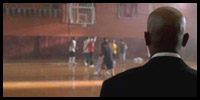 The sports film, an overexhausted mainstay of modern cinema, is a genre so frequently dipped into that originality is beside the point and how efficiently the formula is carried out is the name of the game. Trailing behind two recent pictures about determined coaches and their underdog teams, 2004's hockey-set "Miracle" and 2004's football-centered "Friday Night Lights," the urban basketball drama "Coach Carter" is stirringly similar but not nearly as satisfying.
The sports film, an overexhausted mainstay of modern cinema, is a genre so frequently dipped into that originality is beside the point and how efficiently the formula is carried out is the name of the game. Trailing behind two recent pictures about determined coaches and their underdog teams, 2004's hockey-set "Miracle" and 2004's football-centered "Friday Night Lights," the urban basketball drama "Coach Carter" is stirringly similar but not nearly as satisfying.
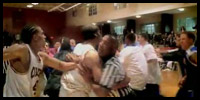 Whereas those two aforementioned efforts were focused and tightly conceived, "Coach Carter" takes the "everything-but-the-kitchen-sink" approach. Save for the merciful exclusion of a star player's unforeseen injury that takes them out of the season, director Thomas Carter (2001's "Save the Last Dance") and screenwriters Mark Schwahn (2004's "The Perfect Score") and John Gatins (2001's "Hardball") leave no sports cliche unturned and no chance for inspirational feel-good moments unvisited. When the basketball court is cleared, what is left is a monotonous 130-minute running time that has no excuse for being at least thirty minutes too long.
Whereas those two aforementioned efforts were focused and tightly conceived, "Coach Carter" takes the "everything-but-the-kitchen-sink" approach. Save for the merciful exclusion of a star player's unforeseen injury that takes them out of the season, director Thomas Carter (2001's "Save the Last Dance") and screenwriters Mark Schwahn (2004's "The Perfect Score") and John Gatins (2001's "Hardball") leave no sports cliche unturned and no chance for inspirational feel-good moments unvisited. When the basketball court is cleared, what is left is a monotonous 130-minute running time that has no excuse for being at least thirty minutes too long.
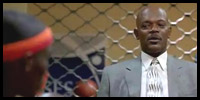 Based on a true story that took place in California, 1999, hardworking store owner Ken Carter (Samuel L. Jackson) is hired as the coach of troubled Richmond High School's basketball team, the Oilers. Coach Carter immediately exhibits himself to his players as someone quite unlike the coaches they are used to, handing out exhaustive exercising punishments for misbehavior and putting a real interest in their educative pursuits when no one else does in their lower-class neighborhood. When Carter insists that the teenage boys, who have no college aspirations and take their school work with a minimum of seriousness, raise their grades to at least a C+ average—and then fail to comply—he locks up the gym and forces them to forfeit games just as their season's winning streak is getting into high gear. An uproar over Carter's decision by the faculty and parents threaten his position at the school, even as the players begin to realize they are capable of doing much more with their lives than they originally thought.
Based on a true story that took place in California, 1999, hardworking store owner Ken Carter (Samuel L. Jackson) is hired as the coach of troubled Richmond High School's basketball team, the Oilers. Coach Carter immediately exhibits himself to his players as someone quite unlike the coaches they are used to, handing out exhaustive exercising punishments for misbehavior and putting a real interest in their educative pursuits when no one else does in their lower-class neighborhood. When Carter insists that the teenage boys, who have no college aspirations and take their school work with a minimum of seriousness, raise their grades to at least a C+ average—and then fail to comply—he locks up the gym and forces them to forfeit games just as their season's winning streak is getting into high gear. An uproar over Carter's decision by the faculty and parents threaten his position at the school, even as the players begin to realize they are capable of doing much more with their lives than they originally thought.
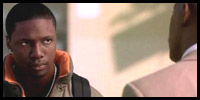 The basketball players in "Coach Carter" are presented as types rather than three-dimensional characters. Kenyon Stone (Rob Brown) is dealing with a girlfriend, Kyra (Ashanti), who has just found out she is pregnant, putting his dreams for the future in jeopardy. Timo Cruz (Rick Gonzalez) refuses to play by the coach's rules and is headed for a life of drugs and crime. Jason Lyle (Tatum Channing) is the token white guy on the team, save for another player who is seen but never heard. And Damien Carter (Robert Ri'chard) is the coach's freshman son, who switches schools to play for the Oilers. The stubbornness and lack of respect for authority these ragtag characters display in the first half does not rub off in time for them to become sympathetic individually for the inevitable finale where they make their way to the championship game.
The basketball players in "Coach Carter" are presented as types rather than three-dimensional characters. Kenyon Stone (Rob Brown) is dealing with a girlfriend, Kyra (Ashanti), who has just found out she is pregnant, putting his dreams for the future in jeopardy. Timo Cruz (Rick Gonzalez) refuses to play by the coach's rules and is headed for a life of drugs and crime. Jason Lyle (Tatum Channing) is the token white guy on the team, save for another player who is seen but never heard. And Damien Carter (Robert Ri'chard) is the coach's freshman son, who switches schools to play for the Oilers. The stubbornness and lack of respect for authority these ragtag characters display in the first half does not rub off in time for them to become sympathetic individually for the inevitable finale where they make their way to the championship game.
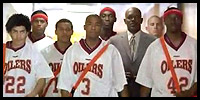 The one aspect in "Coach Carter" that is handled with surprising thoughtfulness is Ken's unwavering outlook on the importance of education in helping to enrich his players and make them see there is more out there in the world than dead-end jobs and crime. Respectably played with a compassion that underlies his exterior forcefulness by Samuel L. Jackson (2003's "S.W.A.T."), Coach Ken Carter stands as a positive role model in that he pays attention to these kids when no one else does at the school, and wants what is best for them no matter the consequences of his own career. While everyone else sees them as good for only one thing—basketball—Carter is adamant that learning will be more valuable for their futures than any after-school sport ever could.
The one aspect in "Coach Carter" that is handled with surprising thoughtfulness is Ken's unwavering outlook on the importance of education in helping to enrich his players and make them see there is more out there in the world than dead-end jobs and crime. Respectably played with a compassion that underlies his exterior forcefulness by Samuel L. Jackson (2003's "S.W.A.T."), Coach Ken Carter stands as a positive role model in that he pays attention to these kids when no one else does at the school, and wants what is best for them no matter the consequences of his own career. While everyone else sees them as good for only one thing—basketball—Carter is adamant that learning will be more valuable for their futures than any after-school sport ever could.
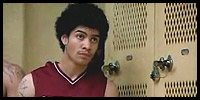 Because the effective dramatic subplot in which the school's head faculty goes up against Carter for his radical decision to cancel practice and basketball games in favor of raising their grades drives the second half of "Coach Carter," it is with a sinking heart that the film culminates with the trite "big game." By this point, the movie had appeared to have more emphatic things on its mind, and its resorting to the granddaddy of all cliches found in sports pictures sticks out like a sore thumb. The championship game, long-winded to the point of tedium and undynamically edited, diminishes the impact of what Carter has achieved with his students as a whole. A preference for the run-of-the-mill over ambitious ideas in the third act ultimately unveils "Coach Carter" as a deceptive film more shallow and cowardly than it lets on.
Because the effective dramatic subplot in which the school's head faculty goes up against Carter for his radical decision to cancel practice and basketball games in favor of raising their grades drives the second half of "Coach Carter," it is with a sinking heart that the film culminates with the trite "big game." By this point, the movie had appeared to have more emphatic things on its mind, and its resorting to the granddaddy of all cliches found in sports pictures sticks out like a sore thumb. The championship game, long-winded to the point of tedium and undynamically edited, diminishes the impact of what Carter has achieved with his students as a whole. A preference for the run-of-the-mill over ambitious ideas in the third act ultimately unveils "Coach Carter" as a deceptive film more shallow and cowardly than it lets on.
|
© 2008 by Dustin Putman |














